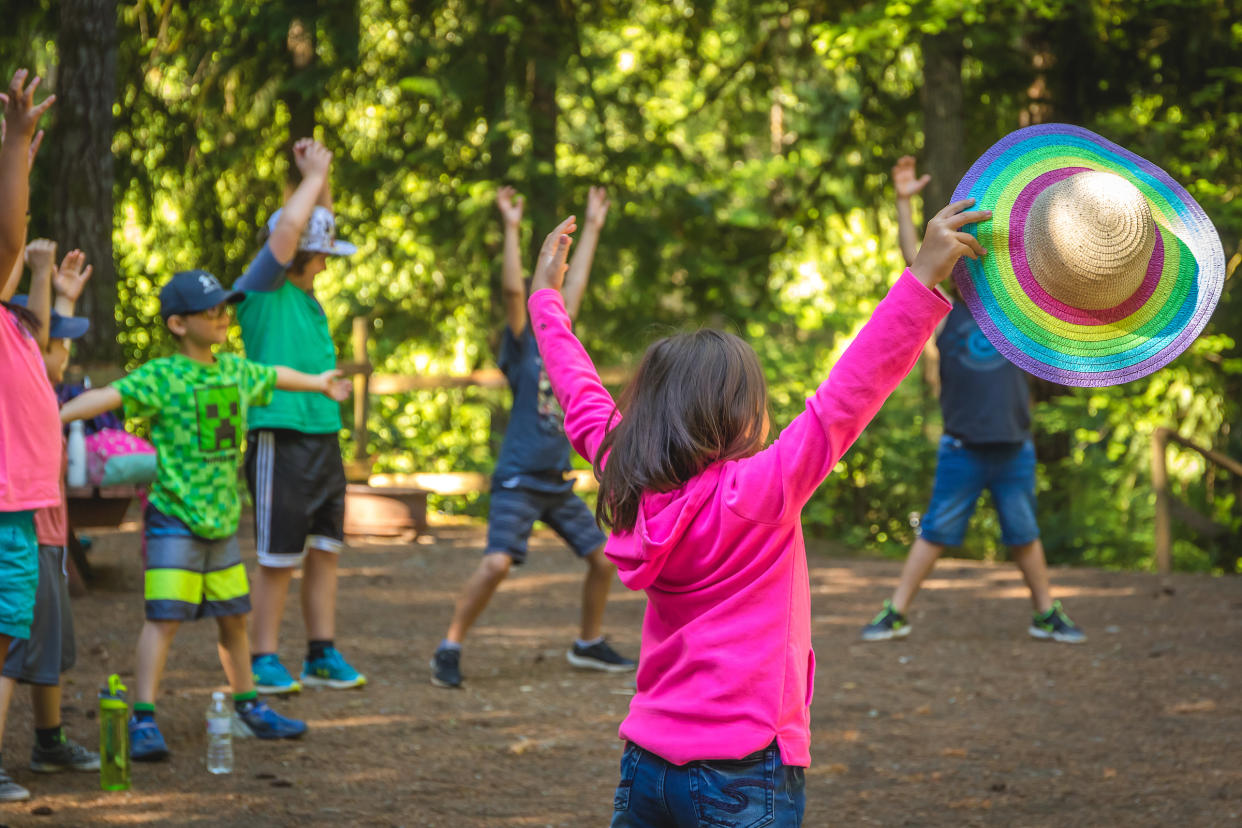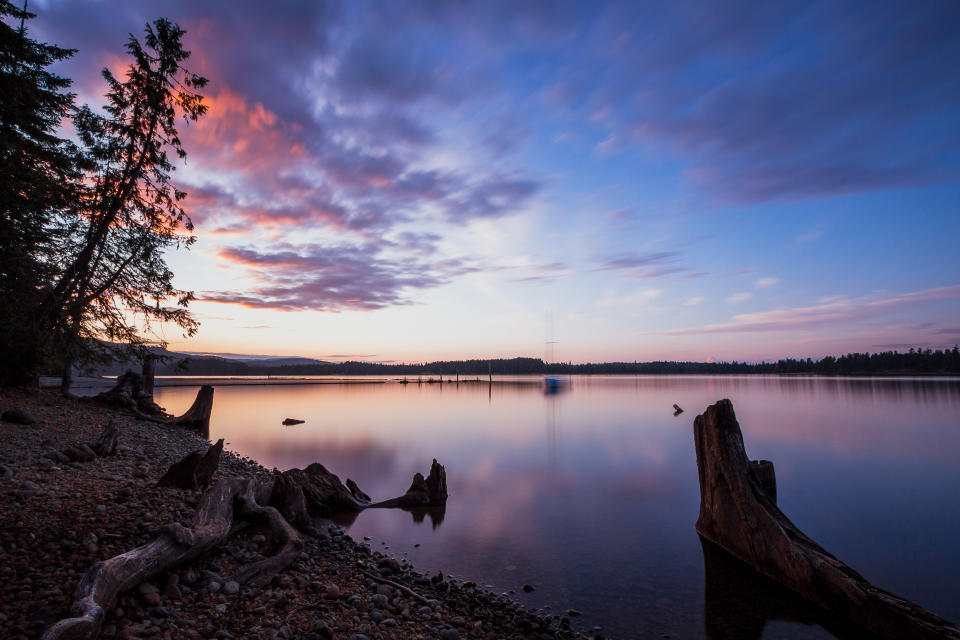Camp Kin provides queer youth in the Comox Valley with a sense of community, belonging

Content warning: This article mentions suicide. If you or someone you know is struggling with mental health, the National Suicide Crisis Helpline can be called at 9-8-8. The BC Mental Health Support Line can be reached at 310-6789 (no area code needed) and the BC Suicide Prevention and Intervention Line is 1-800-784-2433. The Trans Lifeline can be reached at 1-877-330-6366.
At the end of July, youth between the ages of seven and 12 will gather on the shores of Comox Lake for some summer fun and friendship at Lake Park Society’s Camp Kin. They’ll also come together over some common ground: their identity as 2SLGBTQQIA+ (two-spirit, lesbian, gay, bisexual, transgender, queer, questioning, intersex, asexual) or allies.
Camp Kin launched nearly three summers ago to support queer, questioning and/or curious youth. Campers partake in classic summer activities — including swimming, hiking and crafting — while also fostering connections with youth who have shared lived experiences. The daytime camp begins on July 29 and runs through August 16, 2024. This year an additional week has been added to the program, offering camps for two different age groups.
Read more: Low-cost outdoor education camp supports community connection for Comox Valley teens.
To make it more accessible, Camp Kin is also available on a sliding scale rate — from no-cost to full cost, at $300 — with support from subsidies from Wachiay Friendship Centre and the BC Association of Aboriginal Friendship Centres’ Path Forward Community Fund.
Camp Kin provides a space for queer youth to open up as themselves
For Camp Kin counsellor meika johnson, seeing the youth campers in a place where they can wholeheartedly be themselves is the highlight of their job.
The camp is located on private grounds where campers have an opportunity to be in their own space, surrounded by other queer youth and counsellors. johnson said they notice an evident difference between when the youth were surrounded by queer campers and staff staff, and when they were out in public. They said the youth were much more outgoing and open around people who they identify with or feel supported by.
“I didn’t really notice how much they were out of their shell until one day we had to be on the main beach [on Comox Lake] … They were so much more quiet and reserved,” johnson said. “Exclusive spaces for queer youth only are really important and vital because then they get to un-layer themselves from things that they didn’t even know they were hiding.”
They added that they have seen a lot of success with some kids who struggle with specific barriers — such as childhood trauma or an otherwise lack of support — that they have faced in the public school system or at home, and they see the youth thrive in a new light at the camp.
johnson said being a role model for queer youth has brought joy for them as a camp counsellor, as well.
“Working at Camp Kin is very healing for my inner child as a queer youth that didn’t ever see non-binary adults or queer adults, other than like, dead queer tropes in media,” they said.
The benefits of nature-based learning
The outdoor element of the camp is important, too, johnson said.
“Nature … is very diverse in its biology and interactions. And it’s not like the heteronormative way that humans see the world. It’s very queer,” they said.
Last year, the World Wildlife Fund published an article about the many animals humans would consider trans or queer. According to the article, an upwards of 1,500 species engage in same-sex behaviour — a trait that can even help maintain the health of a species population. Same-sex behaviour in female bonobos, for example, has been shown to increase bonds and harmony among their groups, according to a 2019 research paper from Hormones and Behavior.
Male bottlenose dolphins also engage in relationships with one another, hunting for food and travelling the ocean together as pairs — sometimes even living and travelling together for decades.
Other animals — such as clownfish — change sex. And when some bearded dragons lay their eggs at higher temperatures, they lay genetically male eggs that hatch into female lizards with some male-like characteristics.
“Being our full authentic selves is also realizing that we are nature and nature is our relation,” johnson said.
In a previous story for The Discourse, Stuart Higgs, director of education and events at Lake Park Society, noted the importance of nature-based education. He said he noticed an overwhelming concern in a lot of youth he works with about the environmental future they face. Higgs hopes that day camps offered by Lake Park Society will help youth who are struggling with tough mental health situations by giving them a chance to spend time outside and build relationships with their peers.
“And that’s really supported by so much research,” Higgs said.
A January 2024 study published in Scientific Reports found that a 40-minute nature walk enhances brain function and control much more than a 40-minute walk in an urban environment.
Spending time outdoors has also been shown to support mental health in children.

Lifesaving community support
For queer kids — especially transgender and gender nonconforming kids — finding a queer community to be a part of can be lifesaving. Compared to their non-transgender peers, transgender youth are at a much greater risk of suicide as a result of rejection, bullying and victimization.
According to a fact sheet from the Mental Health Commission of Canada, having supportive and strong relationships with family and friends can support the mental wellbeing of transgender youth.
For youth who may be questioning, access to spaces — including queer spaces — where they can learn about and explore their identity can be crucial to their mental health.
“When we make space for people to be their full authentic selves, they get to really blossom into that space,” johnson said. “And then when we make those spaces, we make space for future leaders, inclusion and radical pushback against homophobia.”
johnson said Lake Park Society has received some harassment via phone call for offering Camp Kin, but that Lake Park Society simply used it as a reminder to include diversity, equity and inclusion (EDI) training for all camp counsellors at Lake Park Society.
“It’s really important that we have EDI training in our workplace so that we can know how to support the queer camp and the queer leaders, but also the other staff that have to deal with the fallout of homophobia in our community,” johnson said.
They added that Lake Park Society is a team, and they will not tolerate bigotry.
“We’re going to uplift queer youth regardless of the pushback.”
johnson said they would like to see Camp Kin grow to make space for more queer youth from all over the Island.
“My goal is to turn Camp Kin into a sleepaway camp that kids from all over Vancouver Island — from Victoria to Sointula — come down [to] … with cabins, food, multiple staff and workshops,” they said.
Until then, the camp will continue to run during the daytime.
Camp Kin takes place this summer for ages seven to nine from July 29 to Aug. 2. For ages 10 to 12, the camp will run from Aug. 12 to Aug. 16.
If you have a child who may be interested in the camp, you can find more details and register online.
Madeline Dunnett, Local Journalism Initiative Reporter, The Discourse


